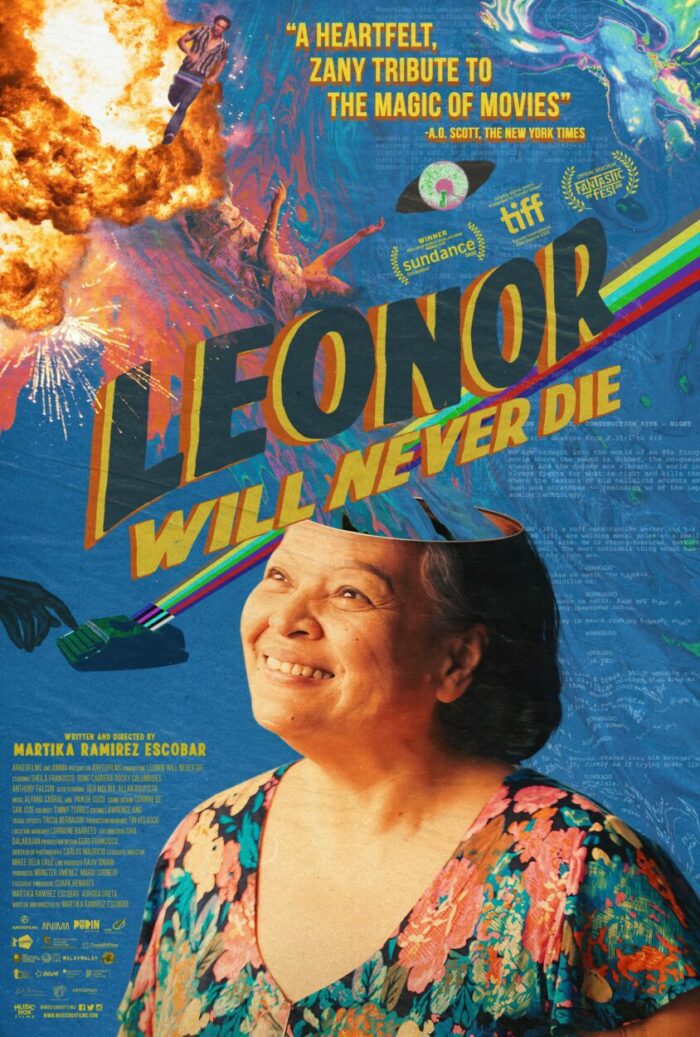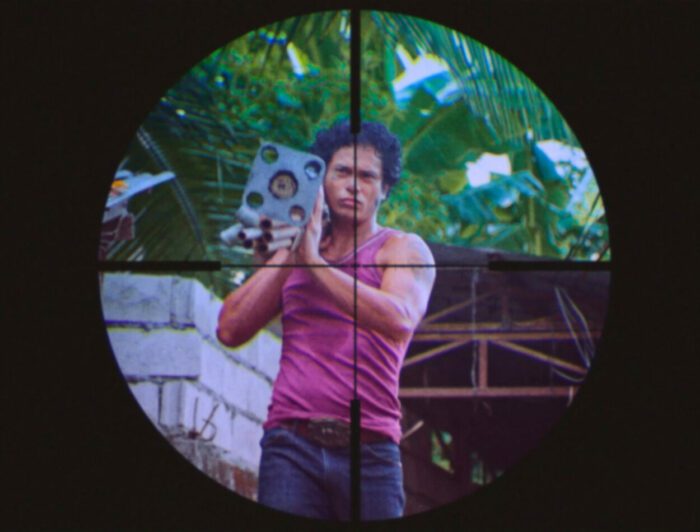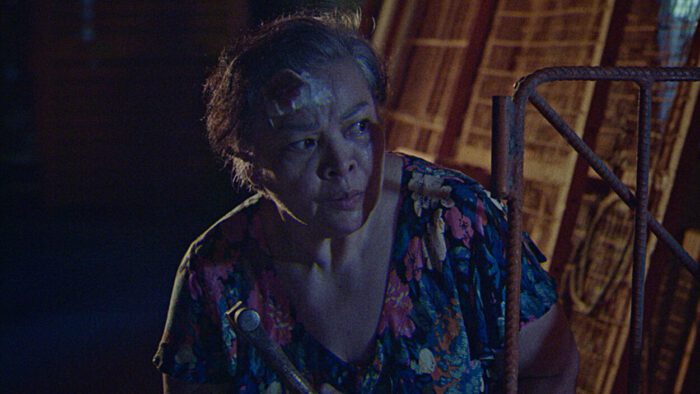An international festival hit last year and awarded Best International Feature at the 2023 Independent Spirit Awards, the marvelously flaky and genuinely inventive Leonor Will Never Die lives on this week in a new Blu-ray and DVD release from Music Box Films. This release will surely delight fans of and newcomers to director-writer Martika Ramirez Escobar’s feature-film debut.
The single disc arrives in a clear jewel case with no booklet, insert, or essays, but an excellent pressing of the feature film and several special features detailing its maker’s journey. A low-budget flight of fantasy, Leonor Will Never Die examines the giddy depths to which cinema can get hardwired in our brains, taking its aged protagonist on an exciting ’80s-based action-flick adventure.

The Film
If cinema is truly the most dreamlike of all narrative art forms, a character in a coma has been a reliable vehicle for fictional fantasy for more than a century. And it still is here: even if it’s a cliched device, the conceit allows Ramirez Escobar to drop her protagonist—a retired filmmaker who once helmed a string of successful action films—smack-dab in the middle of the kind of low-budget shoot-’em-up she once used to create.
Sound fun? It is!
Leonor Reyes (Sheila Francisco) was once a major player in Filipino film, but now, decades later, she struggles with everyday life. She’s aged out of the industry and struggles to pay her bills. Her mind, it seems, can recall the details of the films she used to make and the stars of the telenovelas she watches, but it can’t quite focus on the mundane tasks of daily life. She still mourns her long-dead son Ronwaldo (played as an adult ghost by Anthony Falcon), and even if she can’t always remember to pay her bills, she otherwise has her faculties still. Leonor is a delightful, clever woman engaging with friends and neighbors.
One day, Leonor’s wandering mind comes across an advertisement looking for screenplays, and so she revisits one of her unfinished scripts. It’s a generic actioner about a young stud whom she names in her son’s honor Ronwaldo (played in the film-within-a-film by Rocky Salumbido), forced to avenge his brother’s thuggish murderers. When a freak accident—a heavy old-style cathode-ray television conk on the head—renders her comatose, her fecund imagination takes full flight, and Leonor finds herself in the midst of the very film she was tinkering with.

Part of the joy, then, is the fish-out-of-water comedy of our aged female protagonist suddenly dropped into lovingly-recreated scenes from a never-seen ’80s low-budget Filipino action flick. Seeing Leonor stumble about, interrupting the action, and later taking on the weaponry herself is a joy. The action-film scenes, shot in the old squarish Academy aspect ratio with a lurid color scheme, are a hoot. I find myself wishing that one of the Blu-ray’s special features were that ’80s-style action film itself! (Sadly, it’s not.) Replete with random jump cuts, fake fisticuffs, bad-aim gunfire, and machismo-laden dialogue, the film-within-a-film is a fun exercise in retro-mimicry that gives the sound editors and their library of effects (Bam! Thwack! Whiff! POW!) quite the workout.
Also highly effective is Leonor’s own snarky, knowing meta-commentary on the experience. Having written the script, she’s something of an omniscient, prescient narrator on the action as it unfolds. She knows what each character will say before they say it, when a fight scene is about to break out, and where the action is headed next. That next-level meta-commentary on the action film adds a Charlie-Kaufmanesque (think: Adaptation) quality to the already delightful events unfolding onscreen.

As Leonor, Francisco is really a delight. Bemused and befuddled, clad always in her flowery muumuu and often cradling a cigarette, she seems the unlikeliest of action heroes. But that too is part of Ramirez Escobar’s point: that action films unnecessarily ignore the lives of women except was objects of ardor or rescue. (It’s a point Leonor Will Never Die shares with the recent Full Time and La Civil, to name two.) Her performance also reminds us of the work of women behind the camera and on the page in the industry whose work so often goes unheralded.
I’d love to be able to say Leonor Will Never Die sticks the landing. To extend the metaphor, this particular ride dodges another incoming craft, bumps loudly on the runway, careens about with tires screeching, and finally ends with its exhausted passengers sliding down the emergency exit. Ramirez Escobar notes she extended the film by nearly 30 minutes after being told it didn’t have an ending. I feel like now there are three or four, maybe five of them, all kind of clever in their own meta way, but of no real relation to each other nor any purpose to the film’s meaning.
Even so, the film as a whole remains a delight, and its last ending, so to speak, conveys much of the joy of its friends-and-family collaboration. Leonor Will Never Die is a love letter to cinema that is unabashed in its affection for both the giddily colorful actioners of the ’80s it mocks and the potential of filmmaking to explore our dreams and anxieties. It’s a crazy film, but it’s something special indeed.
Special Features
Feature Audio Commentary: Director-writer Martika Ramirez Escobar’s commentary is primarily a low-key autobiographical reminiscence on the making of Leonor Will Never Die. While some of the content will drift off into tangential relationships and anecdotes, much of the track is insightful. Since the film is such an unusual and inventive affair, it’s nice to hear its writer-director’s approach to the material. Some of the film’s making—like, say, a scene in which a boy at a street market and the protagonist play-act scenes from the kinds of pirated DVDs Ramirez Escobar enjoyed in her youth—is autobiographical. Other, simply the product of a fertile imagination.
With the film divided, largely, between scenes taking place in the reality of Leonor’s medical crisis and those taking place inside her head, in the action film she’s become a part of, Ramirez Escobar’s insights on creating two very different aesthetics is instructive. The comments here range from the blocking of flight scenes and the construction of special effects to the limitations of low-budget independent filmmaking. One gets the sense of Ramirez Escobar’s vision may at times have been uncertain and her intentions compromised, but that her will to complete her film remained undeterred.
Hers is a film made in her home country and with many family members and friends, and for Ramirez Escobar, it was a genuinely collaborative and collegial experience. Even though much of the script and the process was improvised along the way, one gets a sense from this commentary just how vital it was for her to make this film alongside the people she’s known the longest.

“A Film That Built Itself” Interview Featurette. Interspersed with clips from the film and behind-the-scenes footage of its making, Ramirez Escobar is interviewed about the origins and making of the film in this revealing featurette. As a first-time female Filipino filmmaker, Ramirez Escobar is grateful for the assistance and collaboration she received along the way, especially in making a film about film, a fantasy that really does not “fit” exclusively in any known genre.
Viewers of Leonor Will Never Die may or may not be as sanguine about the decision to extend the film by—according to Ramirez Escobar’s account—nearly 30 minutes in search of an ending. It’s a decision she says was made after she considered the film finished, but made necessary by her mentor’s feedback. Personally, I see those last sections of the film the weakest: they all take place outside the diegesis of the action-film Leonor was dreaming and lack its special joie de vivre, and one scene that might serve as an ending is followed by another. And another.
Nonetheless, the interview itself is lively, handsomely shot, and crisply edited and an excellent companion piece to the film. 23 minutes, in English.
“Creature Feature”: A Making of Video Journal: This featurette is a quite informal phone-and screen shot journal of Ramirez Escobar’s journey bringing the film to completion and into the festival circuit. It’s a fascinating journey, especially for a first-time feature filmmaker, raising the funds for travel, competing publicity materials and obligations, and—most especially and completely—coping with a global pandemic that nearly completely shut down the industry and that was especially challenging for festivals and independent filmmakers dependent upon them for distribution deals.
For a first-time filmmaker accepted to Sundance, where Leonor Will Never Die won the Jury Prize for Innovative Spirit, it had to have been especially difficult to settle for a virtual event conducted via Zoom and Eventive. But Ramirez Escobar persevered, and her story of a new filmmaker’s entry to the world of distribution deals and awards is well worth hearing. 14 min., in Filipino, with English subtitles.
Pusong Bato Short Film: “Pusong Bato” (“Stone Cold Heart”) is Ramirez Escobar’s 2014 University of Philippines thesis film-within-a-film about Cinta Dela Cruz, a former movie star in the 1970s. She spends her hours rewatching her old films and reminiscing until one day an earthquake shocks her from her Hollywood dream. In some ways this short film, elegantly shot and produced, serves as a template for her later Leonor Will Never Die, also about an aged woman contemplating, then confronting, her past life in film. Like her documentary Tell Me About Darkness, “Pusong Bato” explores the boundaries between commerce and art, fact and fiction, real life and “reel life” with gentle humor and canny aplomb, staking out some of the self-reflexive terrain the filmmaker would explore in her later work. Starring Mailes Kanapi, Anna Deroca, and Acey Aguilar. 20 minutes, in Filipino with English subtitles.
Photo Gallery // Behind the Scenes Gallery // Artwork Gallery // Theatrical Trailer: Also included with the Blu-ray package are several galleries of stills, behind-the-scenes shots, and artwork from the film as well as its theatrical trailer (below). Young filmmakers getting their start—or hoping to—in the industry will especially likely revel in the film’s joyous, daring approach to cinema and the to special features exploring this young filmmaker’s entry into the world of festivals, distribution, and exhibition. In sum, The Music Box Films Blu-ray disc of Leonor Will Never Die is a small treasure of insights, anecdotes, and revelations from one of the funniest and most surprising films of 2022. And Leonor Will Never Die is just the first, I hope, of many such films to come from its supremely talented director and writer, Martika Ramirez Escobar.
Leonor Will Never Die is available to rent or purchase on digital platforms and releasing on Music Box films March 14, 2023. In Filipino, with English subtitles.



